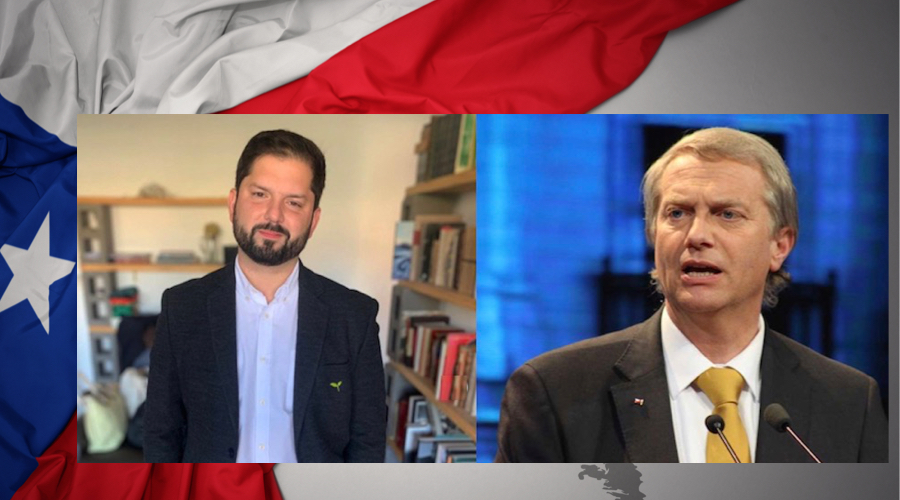
Gabriel Boric and José Antonio Kast face off this weekend in the he most
crucial and polarized election in Chile’s recent history. (Images from Instagram | Flickr Commons.)
Chileans voters head to the polling stations on Sunday in a highly polarized presidential election that has as frontrunners a far-right conservative and a young former student leader on the left, in a face-off of extremes not seen since the country’s return to democracy in 1990.
It comes as the nation is in the midst of drafting a new constitution to replace the one approved during dictator Augusto Pinochet’s military regime, which is considered the main cause of the extreme socio-economic realities that have divided the nations for decades.
The fresh chart is likely to imply tougher rules on water, mineral and community rights, experts say.
Adding to the overall sense of uncertainty, current president Sebastián Piñera (who is barred from seeking a second consecutive term by Chile’s term limits) just survived impeachment.
Until recently, it appeared likely that Chile would elect a new president who shares the protesters’ goals. Gabriel Boric, a 35-year old former student leader allied with the Communist Party, was the favourite for months.
He has centred his campaign on promises of an egalitarian, feminist and ecological Chile.
When it comes to mining, the 35-year old candidate is leaning towards a more active role for the State in the sector, as well as higher royalties.
Ultra-conservative José Antonio Kast, a 55-year-old lawyer, Catholic and father of nine, has instead talked of more private investment in state-owned copper giant Codelco, as well as changes to mining property law. Praising the “economic legacy” of former dictator Pinochet, Kast, often likened to Brazilian President Jair Bolsonaro or former US President Donald Trump, has promised measures to boost foreign investment in the sector.
Both candidates are in favour of diversifying the country’s mining industry into other metals outside of copper and molybdenum, improving sustainability and lowering emissions.
Royalty bill
The results of Sunday’s elections will decide the fate of a controversial tax reform bill that may put a quarter of Chilean copper output at risk.
Under the proposed change, the ‘royalty’ rate – the amount taken by the government – would be based on output rather than profits and could rise to 75% when copper prices exceed $4 per pound.
Around 14 of the country’s large copper mines have production costs above $2.50 per pound. With a royalty, many could be forced to close when prices slip again.
Click here for an interactive chart of copper prices
“Many low-grade operations will be put out of businesses, destroying jobs,” Manuel Viera, president of the Chilean Mining Chamber, said in May.
The full impact of the new tax would not be felt immediately. According to the Mining Council of Chile, most privately owned mines are covered by tax invariability agreements signed with the Chilean state until 2023.
Diego Hernández, president of the National Mining Society (Sonami), which represents firms in the sector, believes the results of Sunday’s election could lead to a period of “investment drought.” This, he has said, would delay the availability of new copper and lithium to meet the expected increase in demand.
The government has projected mining investments of about $70 billion through the end of the decade, most from private firms.
Chile produced last year a third of the world’s copper in the form of concentrates, anodes and cathodes. The nation is also the no. 2 producer of lithium and is home to large zinc, molybdenum, gold, silver and lead reserves.
It’s estimated that Chile would need $150 billion in investment to hit its goal to nearly double copper output by 2050.
Copper is seen as a bellwether for economic growth because of the metal’s central role in construction, wiring and electronic goods. It’s also considered a key metal in the ongoing global transition to a green economy.
BHP, the world’s largest miner, estimates that the world will need almost double the copper in the next 30 years.
The vision echoes those of most experts, from consultants such as Wood Mackenzie, ING Economics and BloombergNEF, to industry actors including top miners and electric vehicles makers lead by Tesla and Volkswagen.
Mining companies and investors alike will be closely following the upcoming events in Chile. The results of Sunday’s presidential and congressional elections, the royalty bill’s future as well as the rewriting of the constitution are all critical for the future of foreign investment in the nation and the availability of critical metals.
If no candidate receives more than 50% of the votes, a runoff will be held December 19. Chileans will also elect new deputies for the 155-member lower house and about half of the senate.
(With files from Bloomberg and Reuters)
No comments:
Post a Comment